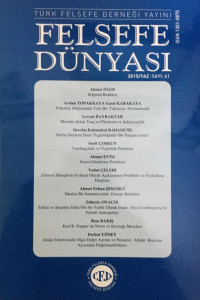Öz
Mustafa Şekip Tunç’un düşünce sistematiğinde felsefe, psikoloji
ve pedagoji ilişki ve etkileşim halindedir. Çünkü düşüncesinin merkezinde
insan gerçeği bulunmaktadır. Bu yüzden psikolojik denilebilecek bir felsefesi
ve felsefi denilebilecek bir psikoloji ve pedagoji görüşüne sahiptir.
Ona göre varlık, çoklu bir yapı içerisinde kendisini açar. H. Bergson ve
W. James’den ilham alarak varlığı, plüralist bir tarzda ele alır. Böylece
maddi ve fizik gerçekliği inkâr etmeden ama bütün gerçekliği de bunlara
indirgemeden madde, hayat ve mana katmanlarını birlikte ve dayanışma
içerisinde ele alır. Varlığa bütünlüklü bir bakışla yönelmesi, onun bilgisi
söz konusu olduğunda da aynı tavrı sürdürmeyi gerekli kılmıştır. Bunun
sonucu olarak epistemoloji alanında da indirgemeciliğe sapmadan, varlık
katmanları ile insanın bilme yetileri arasında karşılıklı ilişkiler kurarak,
madde ve fizik gerçekliğin bilgisini akıl ve zekâdan, hayat ve mananın bilgisini
ise içgüdü ve sezgiden elde etmek yolunu seçmiştir. Varlık ve bilgi
alanlarında sergilenen plüralist tavır alışın yansımaları pedagoji alanında
da görülür. Ona göre insan tek tip olmadığı gibi toplumun ihtiyaç duyduğu
insan da tek tip değildir. Öyleyse eğitim yoluyla yetiştirilmesi düşünülen
insan da tek tip olamaz ve olmamalıdır. Çalışmamızda Mustafa Şekip
Tunç’un Cumhuriyet dönemi Türk düşüncesindeki öncü ve özgün yanları
vurgulanarak onun plüralist felsefesinin varlık, bilgi, değer ve eğitim alanlarındaki
yansımalarının izi sürülmeye çalışılmaktadır.
Anahtar Kelimeler
Mustafa Şekip Tunç felsefe psikoloji pedagoji plüralizm Türk eğitim düşüncesi Türkiye'de felsefe
Kaynakça
- • Bayraktar, Levent, Bergson’da Ruh-Beden İlişkisi, Dergah yay., İstanbul 2010.
- • Tunç, Mustafa Şekip, “İlmin Mebde veya Umdeleri İtibariyle Kıymeti”, Dergâh, 5, 1921
- • _____, “Mezun Olan Yalnız Şuur mudur”, Dergâh, 24, 1921.
- • _____, “Resmin Ruhiyatı ve Ressamlarımız”, Dergâh, 33, 1922.
- • _____, “Bergson ve Gençlik”, Hayat, 108, 1928.
- • _____, “Hayatın Maddeden Farkı”, Hayat, 123, 1929.
- • _____, İnsan Ruhu Üzerinde Gezintiler, İstanbul, 1943.
- • _____, Psikoloji Dersleri, İstanbul, 1950.
- • _____, “İçtimai ve Ferdi Hafıza”, Bilgi, 48, 1951.
- • _____, “Türkiye’de Ahlak Meselesi”, Bilgi, 50, 1951.
- • _____, “Veraset ve Terbiye”, Bilgi, 60, 1952.
- • _____, “Dünya ve Bizim Dünyamız”, Bilgi, 58, 1952.
- • _____, “Din İhtiyacı ve Terbiyesi”, Bilgi, 71, 1953.
- • _____, “Tabiat Âlemi ve İnsan Dünyası”, Bilgi, 75, 1953 .
- • _____, “Müşahhas İnsan ve Bünyesi”, Bilgi, 76, 1953.
- • _____, “Müşahhas İnsan ve Onun Dünyası”, Bilgi, 77, 1953.
- • _____, “Kişinin Değeri”, Türk Düşüncesi, 9, 1954.
- • _____, “Hürriyet Kimlere Niçin Lazımdır”, Türk Yurdu, 255, 1956.
Öz
In the systematic thought of Mustafa ŞekipTunç, philosophy,
psychology and pedagogy are interacted and related to each other. Since
the human reality constitutes the center of his thoughts, he adopts such
an attitude. As a result of this, he has a philosophy that can be regarded
as psychological and a pedagogy and psychology that can be regarded as
philosophical. According to him, being opens itself in a multi-structure. As
inspired by H. Bergson and W. James, Tunç deals with being in a pluralist
way. Thus, without denying the material and physical reality, but not reducing
all reality to these, he handles the layers of matter, life and meaning
in an interdependent and co-operative way. His holistic viewpoint of being
also necessitates the continuity of this same attitude when the knowledge
of being is considered. Hence, without falling into the trap of reductionism
in the field of epistemology, he chooses to obtain the knowledge of matter
and physics from the reason & intellect, and likewise the knowledge of
life and meaning from the instinct & intuition by means of correlating mutual
relationships between strata of being and human’s abilities to know.
The reflections of the pluralist stance exhibited in the areas of being and
knowledge are also seen in the field of pedagogy. To him, human is not a
monotype and the personality society seeks is not monotypic. Therefore,
man who is trained through education cannot and should not be monotype.
In this paper, Mustafa Şekip Tunç’s unique and pioneer aspects during
the Republican period of Turkish thought are emphasized and it is tried to
trace the reflections of his pluralist philosophy in the areas of being, knowledge,
value and education.
Anahtar Kelimeler
Mustafa Şekip Tunç philosophy psychology pedagogy pluralism Turkish education thought philosophy in Turkey
Kaynakça
- • Bayraktar, Levent, Bergson’da Ruh-Beden İlişkisi, Dergah yay., İstanbul 2010.
- • Tunç, Mustafa Şekip, “İlmin Mebde veya Umdeleri İtibariyle Kıymeti”, Dergâh, 5, 1921
- • _____, “Mezun Olan Yalnız Şuur mudur”, Dergâh, 24, 1921.
- • _____, “Resmin Ruhiyatı ve Ressamlarımız”, Dergâh, 33, 1922.
- • _____, “Bergson ve Gençlik”, Hayat, 108, 1928.
- • _____, “Hayatın Maddeden Farkı”, Hayat, 123, 1929.
- • _____, İnsan Ruhu Üzerinde Gezintiler, İstanbul, 1943.
- • _____, Psikoloji Dersleri, İstanbul, 1950.
- • _____, “İçtimai ve Ferdi Hafıza”, Bilgi, 48, 1951.
- • _____, “Türkiye’de Ahlak Meselesi”, Bilgi, 50, 1951.
- • _____, “Veraset ve Terbiye”, Bilgi, 60, 1952.
- • _____, “Dünya ve Bizim Dünyamız”, Bilgi, 58, 1952.
- • _____, “Din İhtiyacı ve Terbiyesi”, Bilgi, 71, 1953.
- • _____, “Tabiat Âlemi ve İnsan Dünyası”, Bilgi, 75, 1953 .
- • _____, “Müşahhas İnsan ve Bünyesi”, Bilgi, 76, 1953.
- • _____, “Müşahhas İnsan ve Onun Dünyası”, Bilgi, 77, 1953.
- • _____, “Kişinin Değeri”, Türk Düşüncesi, 9, 1954.
- • _____, “Hürriyet Kimlere Niçin Lazımdır”, Türk Yurdu, 255, 1956.
Ayrıntılar
| Birincil Dil | Türkçe |
|---|---|
| Konular | Felsefe |
| Bölüm | Araştırma Makaleleri |
| Yazarlar | |
| Yayımlanma Tarihi | 15 Temmuz 2015 |
| Gönderilme Tarihi | 15 Nisan 2015 |
| Yayımlandığı Sayı | Yıl 2015 Sayı: 61 |

